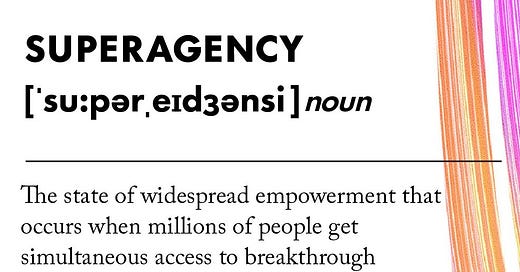Hi all.
While we didn't intend to publish a new post every time we released a new book, that's the groove we've settled into. The nice thing is that it gives us a chance to reflect on the ways that working with each of these very different authors allows us to address a different aspect of the business we're building.
This week’s post celebrates Superagency: What Could Possibly Go Right with Our AI Future by Reid Hoffman and Greg Beato, and so it feels like the right time to talk about technology and the publishing process.
Background: While Superagency wasn't the first book we signed, it was the first one we started working on in earnest, with an initial schedule that would have had the book ready before we were even public as a company. Part of our commitment to authors is that we'll get the book out based on what's right for the book, even if it means breaking all the usual rules of production and selling schedules.
Contemplating an inevitable deluge of books about AI, we signed on to hustle hard and fast and, appropriate to the subject matter, use AI wherever we could to accelerate the path to market.
How did that work out? You'll note that today, January 28, 2025, is significantly after our company announcement nearly eleven months ago. And the whole cycle (about a year) is many times longer than it took Reid and his team to self-publish Impromptu, his first book on AI, and it's longer than what we've pulled off for the four other books we've published.
So, what gives? Well, as much as speed was a priority, we all agreed that quality was even more important. Not to knock AI (because, as someone who uses it every day, I can't), but, left to their own devices, none of the AI tools would have produced a book nearly as good as the one the humans did.
That's not to say we didn't lean heavily on those tools. At each stage – writing, title/subtitle creation, design, audio, marketing – everyone from across Team Reid and Team Authors Equity squeezed as much out of AI as we could. No one was shy in looking to AI for worthwhile shortcuts and powerful boosts.
But at the end of the day, it was human authorship, creativity, and discernment that made this a book we can all be proud of and which we believe will stand the test of time.
For those of you who read it, you'll know that this is exactly the point. AI is not here to replace us. When it's at its best (and that best is obviously getting better every day), it's here to help us all do some things faster and better than we could on our own.
As a startup, AI assistance has been invaluable. It was ChatGPT that helped make sense of the hopelessly complex set of health insurance options available to a tiny company (and it's not to blame that those options are still pretty lame). A whole array of tools came to my rescue over holidays, providing research assistance so my human colleagues could have well-deserved rests.
But: did it write Superagency? No. Greg Beato is the one who pulled more than a few all-nighters to get that done.
Did it design the jacket? No. That was Pete Garceau, the incredibly talented and lovely-to-work-with human designer. (But it is designing these personalized covers available as a gift-with-purchase, which, I must say, are pretty damn cool.)
Did it "record" the audio? This was the area of closest machine-human collaboration, in which human professional narrator Scott Donaldson teamed up with an AI trained with Reid's voice to create a listening experience that you'll actually enjoy, all without breaking Reid's vocal cords.
At every stage, the humans were in charge, but the AI allowed us to achieve more, better, faster than we could have on our own.
That's Superagency (or, at least our scaled-down version of it): The state of empowerment that occurs when millions (or in our case, tens) of people get simultaneous access to a breakthrough technology. With hands-on, self-directed AI, we benefit from our own new superpowers – and everyone else's on the team too.
There's always a lot to fear about technological change, but I for one am choosing to subscribe to the Reid Hoffman vision: optimistic and circumspect at the same time. Confident and hopeful that it can help all of us do and be better.
In Reid’s case, that means setting out to cure cancer. Me? I think I’ll stick to this publishing thing. Different strokes!
Best,
Madeline






Would you use AI to translate a book? I'd be inclined to say no as AI is incapable of understanding context.
Agreed! LLMs can be powerful amplifiers of our knowledge, but the magic remains in humanity and the purpose of our existence. I see abundance of Being in our future.